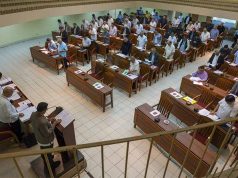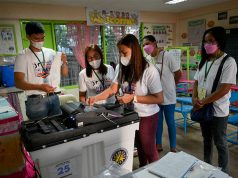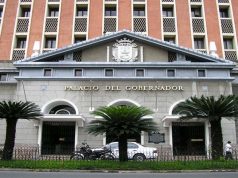A volunteer group condemned the reported hacking of an online rosary crusade it was conducting for the 2022 national elections.
Attendees of the rosary crusade were suddenly greeted by profane images, videos and audio clips which appeared during the session.
AngeLENI, short for Angeles City for LENI, claimed that it was hijacked by “trolls” when its members were praying the rosary “for a clean and peaceful 2022 national elections” and for the “well-being” of Vice President Leni Robredo, Sen. Kiko Pangilinan and their senatorial bets.
The incident, which happened on February 16, was held on Zoom and live streamed on its Facebook page.
The group claimed that the rosary crusade was interrupted by “videos and audio clips filled with violence, gore, profanity, nudity, and vulgarity” at around 6:16 p.m. of that day.
“We at AngeLENi and all participants of the online rosary condemn in the strongest of terms this grave disrespect to God and our Holy Mother, this affront to human decency, and this act of moral turpitude,” the group said in a statement.
“There should be no place in modern society for such hate and malice, but this is the reality that we live in. This is the age of impunity. And these people, these people who laugh at their own vileness, these people who use evil as a tool to work against us, these are the people whom we are actually fighting so hard for,” it added.
“These are the people whom we actually pray for. These are the very same people VP Leni Robredo tells us to love. ‘Radikal ang magmahal.’ Oo, radikal, at napakahirap, pero magagawa natin ito, dahil nagagawa ni VP,” the group further said.
Despite the hacking incident, the volunteers said that they will “continue to fight for a brighter future” and “a better Philippines.”
“We will not be swayed nor shocked nor scared into quitting.
Lalaban tayo. Para sa ‘yo, para sa amin, at para sa kanila. Lalaban tayo,” AngeLENI said.
In the first year of the COVID-19 pandemic, a business advocacy group and two women groups were “zoom-bombed” or hacked on the teleconferencing platform.
Attendees of the virtual meetings saw lewd images on their screens.
“Zoombombing” became rampant in 2020 as the world began its shift to virtual meetings to reduce the risk of COVID-19 transmission.
RELATED: Explainer: Zoom bombs make choosing video apps harder for lockdown chats









